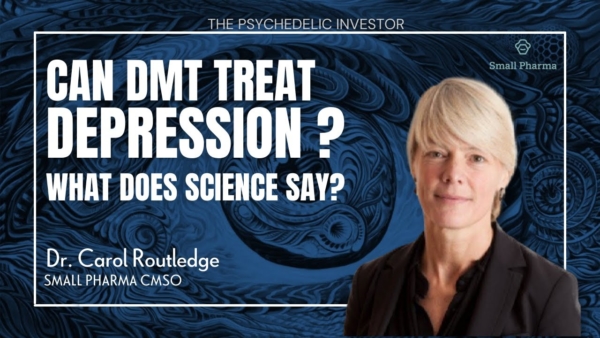
In my position as a business writer for Psychedelic Spotlight, and presenter at the YouTube Channel The Psychedelic Investor, I spend most of my time writing or speaking about the opportunity of psychedelic stocks.
In short, the opportunity is as follows. 1) We are in the midst of a mental health crisis with depression, anxiety and other conditions at all time high levels. 2) Current treatments do not work well 3) Scientific evidence, though early, is showing great promise for treating mental health conditions 4) For investors, the biggest opportunity will come to those who invest in solving this problem early. This is an oversimplification, of course, and for those who want a more in depth analysis, I highly suggest checking out The Thesis for Investing in Psychedelic Stocks.
Despite my belief that a real opportunity exists, in each article, I always try to also highlight the risks involved in these investments, and urge responsibility on the part of anyone considering making an investment. And though I feel I have done a good job of briefly explaining the risks, it is worth expanding on this essential topic. Sometimes, a paragraph just won’t cut it.
Therefore, in this article, I aim to highlight the biggest risks involved in investing in the psychedelic stocks. To be clear, this is not to say that I don’t believe an investment into the sector to be worthy. But all investing carries with it risk, nothing is certain, and in order for you to properly and responsibly manage your money, you must understand the risks involved.
The Road to Profitability
In the long term, in order for an investment to be successful, the company MUST become profitable. It can be debated HOW profitable it must become to justify an investment at any particular level, but at the end of the day, if the company never makes money, it’s long term investors won’t either.
At the moment, no major psychedelic medicines company is profitable. In fact, most don’t even have revenue. Now, as I have argued before, this does not mean that they will NEVER become profitable. An investment in a company that is pre-revenue, and then ultimately becomes very profitable, would produce huge returns.
But there is no guarantee of that happening, and betting on it is inherently risky. Many companies behind psychedelic stocks have no operating history longer than a few years, and therefore no proven track-record of ability to produce revenue and profits.
In the meantime, in order to raise the tens of millions — or even hundreds of millions – of dollars necessary to fund research and clinical trials, psychedelic companies must dilute themselves. This dilution, while necessary at this stage to fund development, further raises the bar on how well the company must perform in the future for you to recoup your investment.
Essentially, the thesis is that psychedelic medicines such as LSD, psilocybin, and MDMA — and their next generation counterparts — will be so effective in treating a range of health conditions, that once they become FDA approved, those who put in the leg work will be able to sell them hand-over-fist. This will make up for any dilution, and turn long-term investors a pretty penny.
Again, this very well could happen. And I believe, for some companies at least, that it will. But it is by no means set in stone. This is a risky bet.
Are Psychedelic Medicines Even Effective?
This is a a risk that I believe diminishes with each passing day, as ever-more data is revealed.
Nevertheless, at the moment, we only have one completed Phase 3 clinical trial involving psychedelics: MAPS’ MDMA-therapy trial treating PTSD. And while that trial had fantastic results, we will need to see dozens more large clinical trials testing psychedelics as medicines before we can be certain of their efficacy and safety.
We have already seen many Phase 2 trials with positive results, and based on current evidence we can make a prediction that psychedelic medicines likely will be effective in treating at least PTSD, addiction, and depression. But before we celebrate too much, we need to see more data. So until we have at least two Phase 3 trials completed with positive data for each mental health condition, we must label potential future failed clinical trials as a risk.
Competition
Here lies what I believe to be the largest risk to psychedelic stock investors. Even though I fully expect psychedelics — particularly psilocybin, MDMA, LSD and DMT — to become legalized as medicines within 5 years, the above risk notwithstanding, there are now more than 50 public companies working with the substances.
They will not all be winners. In fact, most will be losers.
Choosing who the winners will be, 3-5 years in advance, is the riskiest part of investing in psychedelic stocks, in my opinion.
Now, to be clear, there are some obvious steps you can take to mitigate your risks on the competition front. First, do some basic financial research into any psychedelic stock you are thinking of buying. As most companies are pre-revenue, there are three important numbers to look at. First, see how much cash they have on hand, and how much money they are spending each quarter. By dividing the amount of cash they have by the amount they are spending each quarter, you can see their cash runway. This is how much time they have to continue spending at their current rates before they run out of money and have to raise more, through dilution.
Next, look at the company’s market cap. By dividing the amount that they spent in the last year by their market cap, you can see how much dilution, if the stock remains stable, is needed to fund each year of operations. There are many companies who would need to dilute by 50% or more a year to fund themselves at their current spending rate. This is not sustainable.
Finally, make sure the company is actually doing something. Are they running any clinical trials? Do they host ketamine clinics? Do they have patents on next-generation psychedelics? Far too many companies are what I have labeled “aspirational” companies. Their websites and press releases look nice, but everything is projects they will work on, sometime in the future.
By eliminating companies with no money, low market caps, and who are not currently working on anything substantive, we can get that 50 number down to around 20.
But even having narrowed the playing field to around 20, there is still going to be competition. These companies will compete on many factors. For example, even if psychedelics are effective in treating mental health conditions, we still don’t know which ones will be most effective.
There is also the question of next-generation psychedelics. Most serious companies are working on new versions of classical psychedelics, that eliminate some of the issues involved with using them in a therapy or medical setting. But whose will ultimately be most effective? At this stage it is impossible to tell.
My strategy has been to spread my risk, mostly through ETFs such as the Advisor Shares Psychedelics ETF, ticker symbol $PSIL. The theory here is that the huge gains of the few will make up for the total losses of the many. Though of course, this is just my personal strategy for psychedelic stocks and not financial advice
Final Thoughts
The purpose of this article was not to dissuade people from a potential investment in the psychedelics space. As can be seen in my many other pieces for Psychedelic Spotlight, I am a believer in the sector.
But it is essential that you understand the inherent risks. Having done this, act responsibly with your money. It is acceptable to place a speculative bet on a company aiming to make the world a better place, and whose vision of healing is backed by the available scientific data. But don’t overexpose yourself to one company in the industry, or even the industry as a whole.
No one is responsible for your financial future, other than yourself. When investing in the psychedelics sector, or any sector, be responsible with your money.
_______________________________________________________________________
Interested in attending conferences where you can meet the leaders of the psychedelics industry?
Join Paul Stamets, Ronan Levy (Executive Chairman of Field Trip) and more at Canada’s premier psychedelics conference, The Catalyst Summit. Being held in Kingston, Ontario, from May 20th-22nd, the Catalyst Summit is your chance to get the inside scoop on the psychedelics industry.
Purchase your tickets through Psychedelic Spotlight and receive 20% off!
But hurry, tickets will soon be sold out!
Full Disclosure: James Hallifax holds positions in MindMed, Compass Pathways, atai Life Sciences, the Horizons Psychedelic Stock Index, and the Advisor Shares Psychedelics ETF.
The views of the author are for informational purposes only, and should not be construed as financial advice, but rather his own personal opinion. Furthermore, the views of the author are not necessarily representative of Psychedelic Spotlight. His views and opinions are his own.





